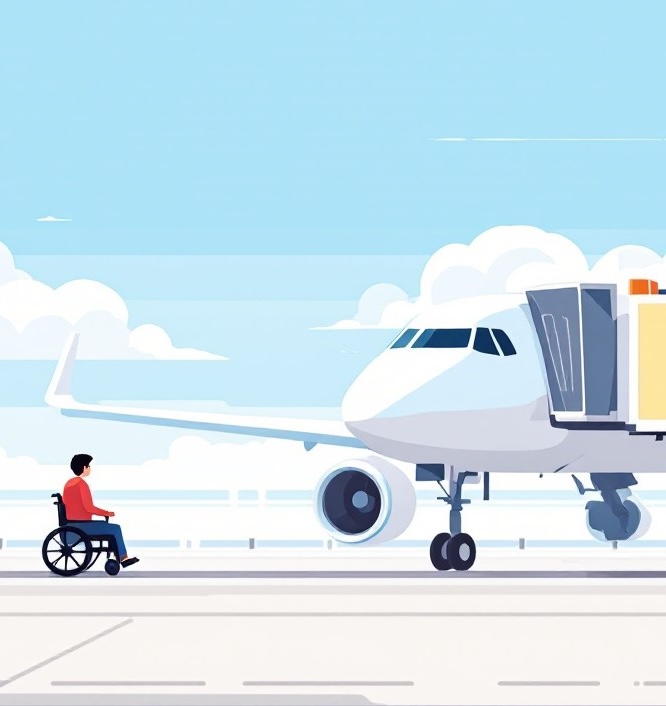UK Air Travel Accessibility Laws: Three Powerful Protections Explained
TLDR:
UK air travel accessibility laws are designed to ensure that passengers with disabilities receive equal treatment and necessary assistance throughout their journey. This article explores the Civil Aviation Act 1982, the Equality Act 2010, and EU Regulation 1107/2006, highlighting how these laws protect passengers and what steps can be taken if rights are not upheld.
Understanding UK Air Travel Accessibility Laws
Navigating air travel can be challenging for passengers with disabilities. UK air travel accessibility laws aim to remove barriers and promote equal access. The key legislations include the:
These laws collectively ensure that passengers with disabilities are not discriminated against and receive appropriate assistance during air travel.
Civil Aviation Act 1982
The Civil Aviation Act 1982 empowers the Civil Aviation Authority (CAA) to oversee and enforce regulations that protect the interests of passengers, including those with disabilities. Section 71 specifically addresses the provision of assistance to passengers with reduced mobility, ensuring that airports and airlines facilitate accessible travel.
Equality Act 2010
Under the Equality Act 2010, it is unlawful for service providers, including airlines and airports, to discriminate against individuals based on disability. This act mandates reasonable adjustments to accommodate passengers with disabilities, ensuring equal access to services.
A notable case highlighting the application of this law is Stott v Thomas Cook Tour Operators Ltd, where the Supreme Court addressed the limitations of compensation under the Montreal Convention for a passenger who suffered discrimination during a flight.
EU Regulation 1107/2006
Despite Brexit, EU Regulation 1107/2006 remains part of UK law. This regulation ensures that passengers with disabilities or reduced mobility are not denied boarding and receive necessary assistance at airports and on board aircraft. It also stipulates that assistance must be provided free of charge.
CAA Guidelines Supporting UK Air Travel Accessibility Laws
The CAA’s CAP 1228 outlines performance standards for assistance services at UK airports, ensuring that passengers with disabilities receive timely and effective support.
Challenges in Implementing UK Air Travel Accessibility Laws
Despite legal requirements, many airline websites and booking platforms remain inaccessible to passengers with disabilities. Issues include incompatible screen readers, lack of alternative text, and complex navigation structures. Reports made to our customer feedback survey also indicate variability in the quality of assistance services across UK airports. Airlines and airports are attempting to address this – for instance, Edinburgh Airport has partnered with OCS to enhance support for passengers with reduced mobility, highlighting efforts to improve compliance with UK air travel accessibility laws, although many aircraft still lack accessible lavatories and adequate space for mobility aids, posing significant challenges for passengers with disabilities (particularly mobility impairments) during flights. These limitations underscore the need for continued advocacy and enforcement of UK air travel accessibility laws.
International Perspectives on Air Travel Accessibility
United States: Air Carrier Access Act
The Air Carrier Access Act prohibits discrimination based on disability in air travel. Enforcement actions, such as the $50,000 fine against Delta Air Lines, demonstrate the U.S. commitment to upholding accessibility standards.
Canada: Accessible Transportation for Persons with Disabilities Regulations
Canada’s Accessible Transportation for Persons with Disabilities Regulations mandate that transportation service providers accommodate passengers with disabilities, ensuring equal access to air travel services.
Australia: Disability Discrimination Act
Australia’s Disability Discrimination Act protects individuals from discrimination in various sectors, including air travel, by requiring service providers to make reasonable adjustments for passengers with disabilities.
Empowering Passengers: Know Your Rights
Understanding UK air travel accessibility laws empowers passengers with disabilities to advocate for their rights. If you encounter issues:
- Request assistance or accommodations directly from the airline or airport.
- File a formal complaint with the Civil Aviation Authority.
- Seek legal advice if necessary, referencing relevant legislation and case law.
For more information on sharing your experiences or providing feedback, visit our Customer Feedback page.
Want to help shape the future of inclusive air travel? We’re building our advisory panel and would love your insight. Whether you’re an airport staff member, a passenger with lived experience, or a policymaker, your voice matters. Join the Access-air-bility Advisory Panel today.
You can also complete our quick feedback form or share your detailed thoughts via our full experience survey. Prefer a conversation? Get in touch through our contact form and we can arrange to speak with you at a convenient time. Let’s work together to create accessible, empowering air travel for all.



